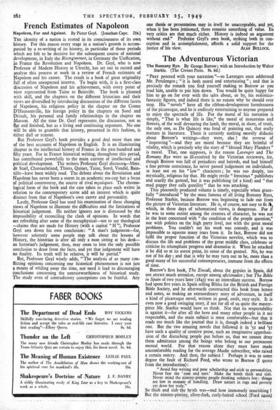French Estimates of Napoleon
Napoleon, For and Against. By Pieter Geyl. (Jonathan Cape. 21s.) THE identity of a nation is rooted in its consciousness of its own history. For this reason every stage in a nation's growth is accom- panied by a re-writing of its history, in particular of those periods which are felt to be decisive for the subsequent course of national development, in Italy the Risorgimento, in Germany the Unification, in France the Revolution and Napoleon. Dr. Geyl, who is now Professor of Modern History at Utrecht, has set out to record and analyse this process at work in a review of French estimates of Napoleon and his career. The result is a book of great originality full of often unexpected interest. To begin with, it is a first-class discussion of Napoleon and his achievement, with every point of view represented from Taine to Bainville. The book is planned with skill, and the chapters on the different historians and their views are diversified by introducing discussions-of the different facets of Napoleon, his religious policy in the chapter on the Comte D'Haussonville, his foreign policy in the chapters on Sorel and Driault, his personal and family relationships in the chapter on Masson. All the time Dr. Geyl represents the discussion, not as
at and finished, but as a living and continuing argument. No one 'Will be able to grumble that history, presented in this fashion, is either dull or remote.
But Professor Geyl's book provides a good deal more than one of the best accounts of Napoleon in English. It is an illuminating chapter in the intellectual history of France in the past hundred and fifty years. For in France historical writing, throughout this period, has contributed powerfully to the main current of intellectual and political development. The writers Professor Geyl discusse4—Mme. de Stael, Chateaubriand, Thiers, Quinet, Taine, Sorel, Vandal, Bain- ville—have been widely read. The debate about the Revolution and Napoleon has never been a storm in an academic tea-cup but a focus of political controversy, the source of rival Mystiques. The chrono- logical form of the book and the care taken to place each writer in relation to the contemporary scene add an interest which is quite distinct from that of Napoleon's own career and personality.
Lastly, Professor Geyl has used his examination of these changing views of Napoleon to illustrate the difficulties and the limitations of historical judgement. He neither ignores nor is distressed by the impossibility of reconciling the clash of opinions. In words that are refreshing after some of the metaphysical—not to say theological —claims that are made for History (with a capital " H "), Professor Geyl sets down his own conclusion: "A man's judgement—for, however solemnly some people may talk about the lessons oi History, the historian is after all only a man sitting at his desk— an historian's judgement, then, may seem to him the only possible conclusion to draw from the facts, and yet that judgement will have no finality. Its truth will be relative, it will be partial." But, Professor Geyl wisely adds, "The analysis of so many con- flicting opinions concerning one historical phenomenon is not just a means of whiling away the time, nor need it lead to discouraging conclusions concerning the untrustworthiness of historical study. The study even of contradictory conceptions can be fruitful. Any one thesis or presentation may in itself be unacceptable, and yet, when it has been jettisoned, there remains something of value. Its very critics are that much richer. History is indeed an argument without end." ProfeSfor Gcyrs own book, striking both in con- ception and in accomplishment, affords a solid support for the


































 Previous page
Previous page